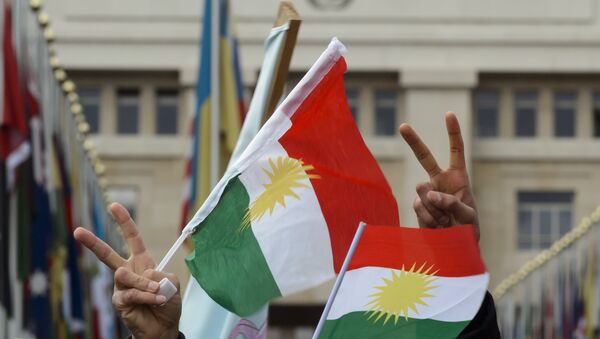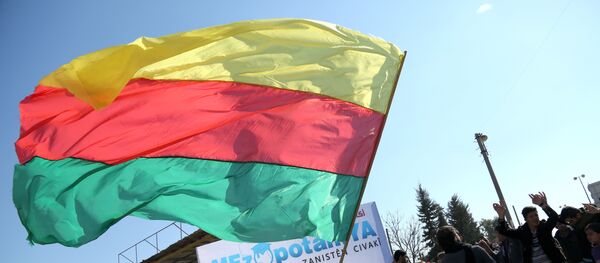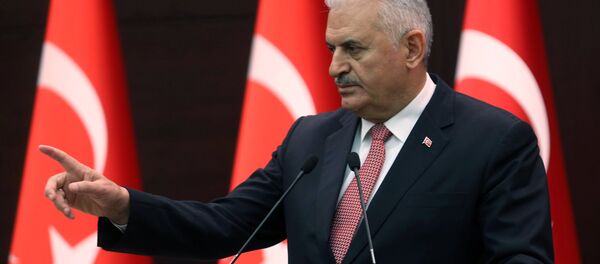The emergence of a sovereign Kurdish state in the Middle East would turn the region upside down resulting in the de facto abolition of the international doctrine of the inviolability of Mideast borders, Israeli political analyst Avigdor Eskin writes in his op-ed for RIA Novosti, commenting on the upcoming independence referendum in Iraqi Kurdistan.
"So, what would happen if the Iraqi Kurds vote for independence and secession from Iraq?" Eskin asks.
According to the political analyst, this will mean, first, the collapse of the Iraqi state, both de jure and de facto; second, the defragmentation of Syria, which is "already divided into several zones of influence"; third, Lebanon may repeat the fate of Iraq and Syria; fourth, Turkey and Iran will find themselves in a heap of trouble, as their Kurdish population may also demand independence.
Additionally, the creation of an independent Kurdish entity in Iraqi Kurdistan or in Syria would also have repercussions for an ongoing conflict between the Turks and the Kurds.
The only country that supports the Kurdish independence vote is Israel, Eskin points out.
"There are historical reasons behind this," Eskin explains. "Since the late 1950s, Israeli advisers actively assisted the legendary Kurdish leader Mustafa Barzani, and in the modern time the Israelis were the first to come to the rescue of his son Masoud Barzani."
In mid-August the Jerusalem Post reported, citing sources familiar with the matter, that Israeli Prime Minister Benjamin Netanyahu expressed a "positive attitude" toward a Kurdish state in the Kurdish areas of Iraq, calling the Kurds "brave, pro-Western people who share our [Israeli] values," during a meeting with a group of 33 Republican congressmen.
Speaking to Radio Sputnik on August 15, Shlomo Brom, a former director of the Strategic Planning Division of the Israeli Defense Forces, surmised that Israel is looking for allies in the Middle East, since "the Israeli-Arab conflict has not been resolved yet."
However, Eskin notes in his op-ed that even Israel admits the potential risks of recognizing an independent Kurdistan in light of the simmering conflict between Israel and the Palestinians, who are also seeking sovereignty.
Still there are clear signs that the Iraqi Kurds are determined to push ahead with their independence vote, no matter what, the Israeli political analyst points out, citing the fact that according to some estimates, the Kurdish population of the Middle East amounts to some 40 million people.
"Millions of Kurds will vote for independence on September 25. The government of Iraq will declare it illegal, Turkey will vocally protest and Iran will increase military pressure," Eskin assumes, highlighting that regardless of the opposition of regional powers "the Kurds are stronger than ever and inspired by new successes in the battles against Daesh (ISIS/ISIL)."
"Prepare yourself for a Kurdistan independence referendum as for a nuclear blast," the Israeli political analyst points out.
Meanwhile, the official campaigning for Iraqi Kurdistan's referendum on independence from Iraq, scheduled for September 25, kicked off on September 5 and will last for 18 days, according to local media.
The referendum requires a "yes" or "no" answer to the question: "Do you want the Kurdistan Region and the Kurdistan areas outside the administration of the Region to become an independent state?"
The Kurdish Rudaw media outlet specified that entities, political parties and people are now able to launch campaigns for or against the independence, provided that they have made all the necessary arrangements with the Kurdistan Region's Independent High Electoral and Referendum Commission.
The Iraqi government has already signaled that it will not recognize the results of the referendum, while the US sent an official request in early August asking the Kurdistan Regional Government to postpone the vote.
In 2005, the Iraqi Constitution recognized Kurdistan as an autonomous region that was run by the Kurdistan Regional Government. Since then, Kurdistan's authorities have repeatedly raised the issue of regional independence.



